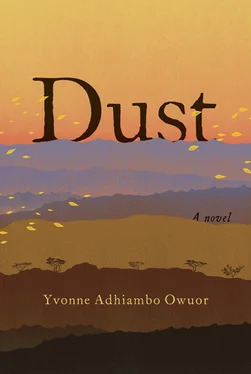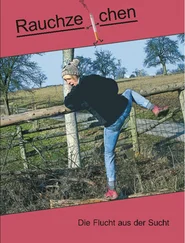Against Mount Forola’s shimmering, the platoon split into squads to scour territory, move northeastward, read trees and bushes, pore over ground marks for freshness, watch the movement of birds, the slither of lizards. A white-bellied go-away-bird warned them.
A three-day trail flecked with blood: jackal’s meal. Next to a black boulder, five zebras had been disturbed. Farther to the left, human footprints headed northeast. Thirteen, no, seventeen separate prints. Man hunting man in comradeship. Predatory subtlety; soft, no-fuss walking. Silent gestures — a look could say everything. Muscular wakefulness, essential manliness, as if this were how it had always been. Hypnotic life, a clarity of worlds so that he could see even past the clouds. Close-target reconnaissance work. He was in a platoon fanning out in the northern terrain, tracking scents. Women, children, and elderly equaled prey, equaled game. Blasting hapless homesteaders, AK-47–ing camel herds to encourage cooperation. They mowed down elephant families, loaded tusks into lorries with blacked-out number plates. Destination, Singapore via State House.
The national economy of secrets.
One night, a human screams, “Am I now the enemy, afande ?”
Nyipir remembered that despised things also cried.
But.
Thou shalt not kill? That was for another season. It was simpler to obey commands for the good of the nation. No questions asked.
Later, Nyipir, like others, marched up to receive his Head of State Commendation. Listened to citations for “Tactical excellence. Intelligence. Agility. Service beyond the call of duty.” Ushujaa —heroism. Discretion — which mostly meant, Keeps secrets .
He was rewarded. Nyipir moved to the Anti-Stock Theft Police Unit, as trainer and supervisor of horses, mules, camels, and people. A journeying man who rode for weeks, chasing down rustlers and bringing Kenya’s livestock home. Great work.
Memories are ghosts .
Now Nyipir strikes the ground with all his strength.
From the top of the hole a voice he despises.
“Excuse me.”
Nyipir ignores it.
“Sir …” Isaiah repeats. Papers crinkle, and he leans forward.
“What, Bolton?”
“About this house … I found some plans in the library, here, hope you don’t mind.…” Isaiah shows Nyipir a yellowing sheet with penned sketches. Portions of the paper break off. “The house, Wot Ogyek.”
“Wuoth Ogik.”
“Yes.”
“No,” says Nyipir.
“My father …”
“Go away.”
“My father, Hugh …”
Nyipir returns to digging, sorts out the bigger rocks from the smaller. Isaiah stoops over the hole again. “Might you know who the woman in my father’s work is?” He steadies the bookmark in front of Nyipir’s eyes. Nyipir brushes away the paper. Isaiah pushes it forward. Nyipir slaps it away.
Yes . He knows the day, time, and emotion of the making of the painting. By the time he raises his head from the pit, a red-eyed meanness owns him. Rage. He has killed men before. He could kill again. “And if I do?” Nyipir asks, a thin twitching of lips, darkening of pupils.
Isaiah backs away. “Your son, Moses, sent me this.”
Nyipir wags a finger. “You’ll not say his name. You’ll not speak his name!” Nyipir throws his shovel at Isaiah.
Isaiah’s arms jut out, ready to fight, but he chooses flight. He hurls himself at the house and kicks the low couch twice. He will stay. He hates this place, but damned if he will leave without getting what he has come to find. He blinks, rubs his eyes; in the silence, he hears the sound of his thumping heart.

That afternoon, in the landscape, a multinational smattering of voices and the BBC World News signal as the Trader crosses the land. Today, for him, the voices are ambient noise. When he left Wuoth Ogik, leaving his camel and goods behind, he gave himself over to a dream in which his wives and children were still with him and his grandchildren played amid fat cows, green grass, and weekly rain.
The Trader walks until he reaches the white picket fence that is the mission where the Jacobses live and preach a version of their Gospel, teaching, healing, and baptizing in the name of God. It is a rectangular white house, a larger version of a Mississippi sharecropper’s house, surrounded by purple and yellow flowers hanging in little pink boxes around the fence. Spikes like sentries around a formerly communal watering hole. New cement on a foundation that is to become a worship center. The Trader stares at the half-adobe, half-canvas medical center. The fly trap, he calls it.
The Trader stakes out the place, not moving for almost two hours, until the sun-blotched pastor, an angular man, trots out. His watery, pink, pale-blue-eyed wife watches from the door. In a loud, smiley voice, in a new dialect of Kisetla, the man announces, “Hapa kwetu ni ufalme ya Mungu.” He flaps his hands in all directions, delineating the territory of the Kingdom of God. The action swats flies, and he swivels his neck like a pretty giraffe.
The Trader wants the freckled man to recognize him. He remembers gray eyes that were suspicious and intense.
“Medicine,” creaks the Trader, slouching so as to meet the missionary’s low expectations about the meaning of his life. The wind tosses sand at them. The Trader clutches his chest, in the place in his heart that is being cut into pieces.
Within three hours, the Trader has surrendered his radio, taken the prerequisite disinfected shower, been photographed for the mission’s fund-raising Web site, and chosen Sila for his baptismal name. These gain him admission and a safari bed with a thin mattress. His heartbeat is measured, blood pressure noted; aspirins are administered; he is encouraged to rest.
“You’ll be fed,” Mrs. Jacobs says in slow, loud nasal sounds. “And, Sila, as a new lamb in the Kingdom of God, you shall pray.”
Sila cries. “The devil is conquered. The perfidious liar! Praise God!” concludes Mrs. Jacobs.
Dawn. Before breakfast, the Jacobses and three acolytes gather to pray around the Trader’s bed. Their prayers include a sequence in which the Trader gets a chance to renounce Satan again, his works, pomps, and empty promises. “You are a free soul now, Sila.” Pastor Jacobs gives him a watery smile. “Rejoice.”
The Trader closes his eyes and heaves a sigh, tempted by the simplicity of being Sila, of being thought for and hoped for.
The prayer warriors leave to have breakfast.
When some time has passed, the Trader tosses off the sheet, throws on clothes, grabs his radio, and escapes the mission through the window. His body shivering, he heads toward his tukul , a six-hour run from the mission.

Not too far from Wuoth Ogik, near a green-stained waterhole where two years ago a pair of hippos had been seen, a crazed d’abeela waits for another soul to frighten to death.
Radio crackle.
The Trader turns the corner and glimpses a man’s silhouette. He sees the snow-white hair, the flecks on the man’s face mirroring the creases hacked into his heart. The Trader knows the meaning of the misshapen turban and the dance of the devil in the wide, red, and furious eyes glaring at him.
The Trader sings, feather-light, “ D’abeela, maan feeti? You’re awake?”
He gets an answer that is arcane, succinct, and crude from a voice that is like a thin flute’s song carving fleeting presences into the soul. But the d’abeela ’s eyes fill with tears.
Читать дальше












